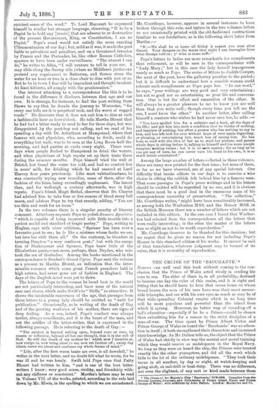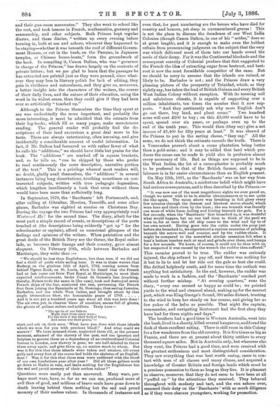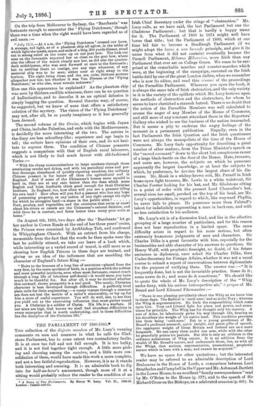THE CRUISE OF THE 'BACCHANTE:*
NOBODY can well read this book without coming to the con- clusion that the Prince of Wales acted wisely in sending his sons to sea. The elder of them is, in all probability, destined to become one day the ruler of this realm, and it is right and fitting that he should learn to love that ocean home on whose broad bosom the men of his race have won their most memor- able triumphs, and see with his own eyes as much as may be of that wide-spreading Colonial empire which in no long time will be more populous and powerful than the island from which it sprang. Moreover, no better way of rounding off a lad's education—especially if he be a Prince—could be chosen than submitting him for a season to the strict discipline of a man-of-war. The time spent by Prince Albert Victor and Prince George of Wales on board the Bacchante' was an educa- tion in itself ; it both strengthened their characters and increased theirknowledge. As Mr. Dalton tells us, the object that the Prince of Wales had chiefly in view was the mental and moral training which they would receive as midshipmen in the Royal Navy. So long as they were on board the ship, the Princes were treated exactly like the other youngsters, and did all the work which falls to the lot of the ordinary midshipman. " They took their turns in all weather, by day or night, at watch-keeping and going aloft, at sail-drill or boat-duty. There was no difference, not even the slightest, of any sort or kind made between them - The Cruise of liar Majesty's Ship • Baoohanto,* 1871149113. Compiled from the Private Letters, Journals, and Note-books of Prince Albert Victor and Prince George of Wales ; with additions by John Dalton. Lonclan : Macmillan and Co.
and their gun-room messmates." They also went to school like the rest, and took lessons in French, mathematics, gunnery and seamanship, and other subjects. Both Princes kept regular diaries, and these diaries, " written up every evening before turning in, both at sea and ashore, wherever they happened to be staying—whether it was beneath the roof of different Govern- ment Houses, or out in the bush, on the Pampas, in Japanese temples, or Chinese house-boats," form the groundwork of the book. In compiling it, Canon Dalton, who was " governor in charge of the Princes," has drawn largely on the contents of private letters ; but we are glad to learn that the passages he has extracted are printed just as they were penned, since what- ever they may lose in literary polish for lack of editing, they gain in vividness and naturalness, and they give as, moreover, a better insight into the characters of the writers, the course of their daily lives, and the nature of their education, using the word in its widest sense, than they could give if they had been ever so artistically " touched up."
Although to the Princes themselves the time they spent at sea was undoubtedly the more important., and probably the more interesting, it must be admitted that the extracts from their log-books, which fill so many pages, make monotonous reading. The general reader will probably find the de- scriptions of their land excursions a great deal more to his taste. These are always entertaining, often amusing, and give incidentally a considerable amount of useful information. In fact, if Mr. Dalton had favoured us with rather fewer of what he calls his "additions," we should have little but praise for the book. The " additions " are marked off in square brackets, and, as he tells us, " can be skipped by those who prefer to read continuously the more descriptive, narrative portion of the text." This is a privilege whereof most readers will, no doubt, gladly avail themselves, the " additions " in several instances being long dissertations, touching sometimes on con- troverted subjects, written with true pedagogic dogmatism, which lengthen inordinately a book that even without them would have been more than sufficiently long.
In September, 1879, the Bacchante' left Portsmouth, and, after calling at Gibraltar, Messina, Teneriffe, and some other places, Barbados was sighted at sunrise on Christmas Day. During the voyage the two Princes had very appropriately read Westward Ho ! for the second time. The diary, albeit for the most part a simple record of events, or descriptions of the ports touched at (the descriptions being evidently "got up " for the schoolmaster or captain), afford us occasional glimpses of the feelings and opinions of the writers. When patriotism and the great deeds of the British Navy are the theme, the Royal sailor- lads, as becomes their lineage and their country, grow almost eloquent. On February 20th, while between Barbados and Martinique, they write thus :-
" We should be less than Englishmen, less than men, if we did not feel a thrill of pride while sailing here. It was in these waters that Rodney, on the glorious 12th of April, 1782, coming across from behind Pigeon Rock, on St. Lucia, when he heard that the French had at last come out from Port Royal, at Martinique, to meet their expected reinforcements, broke Count de Grasse's line (teaching, thereby, Nelson to do the same in like case), took and destroyed seven French ships of the line, scattered the rest, preventing the French fleet from joining the Spaniards at St. Domingo, thus saving Jamaioa, Barbados, and the whole West Indies, and brought about by that
single tremendous blow, the honourable pisace of 1783 And it is not yet a hundred years ago since all this was here done ! The air even yet, in clearest blaze of sunshine, seems full of ghosts, the ghosts of gallant sailors and soldiers. Truly here-
" The spirits of our fathers
Might start from every wave ; For the deck it was their field of fame, And ocean was their grave,•'_
start and ask us, their sons, ' What have you done with those islands which we won for you with precious blood !' And what could we answer ? We have misused them, neglected them till, at the present moment, ashamed of the slavery of the past, and too ignorant and helpless to govern them as a dependency of an overburdened Colonial bureau in London, now slavery is gone, we are half-minded to throw them away again, and give them up, no matter much to whom. Bat was it for this that these islands were taken and retaken, till every gully and every foot of the ocean-bed holds the skeleton of an English- man ? Was it for this that these seas were reddened with the blood of our own forefathers year after year ? Did all those gallant souls go down to Hades in vain, and leave nothing for the Englishman but the sad and proud memory of their useless valour ?"
Questions more easily put than answered. Many wars, per- haps most wars, have, so far as we can see, produced more of evil than of good, and millions of brave souls have gone down to death leaving behind them nothing but the sad and proud memory of their useless valour. In thousands of instances not even that, for past numbering are the heroes who have died for country and honour, yet sleep in unremembered graves ! This is not the place to discuss the decadence of our West India Colonies (though Canon Dalton, in one of his " asides," does so at great length), and it is enough to make even the boldest refrain from pronouncing judgment on the subject that the very war which delivered most of them into our hands sowed the seeds of their decay. For it was the Continental blockade and the consequent scarcity of Colonial produce that first suggested to the French the idea of extracting sugar from beetroot, and beet- root is now the most formidable competitor of the cane. But we should be sorry to assume that the islands are ruined, or likely to be. Barbados is not ; and the Princes draw a very pleasing picture of the prosperity of Trinidad, which, as they rightly say, has taken the lead of British Guiana and every British West Indian Colony without exception. With its teeming soil and salubrious climate, it is capable of supporting over a million inhabitants, ten times the number that it now sup- ports. " And they pertinently ask why more English don't go out there, buy land, and plant cocao." Two hundred acres will cost £200 to buy ; on this £3,000 would have to be spent, spread over six years, or perhaps even up to the end of the tenth year. This would then (they say) give a net income of £1,400 for fifty years at least." It was shrewd of the Princes to put in the saving clause, " they say." All the same, we do not think the estimate exceeds the truth. There is a Venezuelan proverb about a cocao plantation being better than a gold-mine ; and it may be added that land which pro- duces the cocao can be made to yield also in profusion almost every necessary of life. Bad as things are supposed to be in the West Indies, the lot of a cocao-planter is probably much to be preferred to that of the British farmer, and a negro labourer is in far easier circumstances than an English peasant.
On May 12th, 1881, as the Bacchante' was on her way from South Africa to Australia, a misfortune befell which might have had serious consequences, and is thus described by the Princes :—
" It was now one of the most magnificent sights we ever gazed on, though we never wish to be in similar circumstances or to see quite the like again. The moon above was breaking in full glory every few minutes through the densest and blackest storm-clouds, which were here and there riven by the blast ; the sea beneath was literally one mass of white foam, boiling and biasing beneath the gale. For a few seconds, when the Bacchante' first broached to, it was doubtful what would happen, but no one had time to think of the peril we were in, for at once the old ship came to the wind and lay to of her own accord. Having gone into the cabin under the poop just before she broached to, we experienced a curious sensation of grinding beneath the screw-well and counter, and by the rudder-chain. It might be compared to the somewhat similar sensation felt when a boat's bottom touches rock or sand and grinds over them, and bumps for a few seconds. We knew, of course, it could not be thus with us, but suspected it was caused by the wrench the rudder then suffered."
This surmise proved to be true. The rudder was seriously injured, the ship refused to pay off, and there was nothing for it but to lie to and let her ride out the gale as best she could. She drifted helplessly south, and for some time the outlook was anything but satisfactory. In the end, however, the rudder was made to work in a fashion, and the Bacchante' reached port without further mishap. " At evening quarters," runs the diary, " every one seemed as happy as could be ; we pointed yards to the wind and steamed ahead, making up for the nearest port, which was King George's Sound, 380 miles distant, trusting to the wind to keep her steady on her course, and giving her as few pokes of the helm as possible. That night the captain, commander, and navigating lieutenant had the first sleep they have had for three nights and days."
The brothers had a good time in Western Australia, went into the bush, lived in a shanty, killed several kangaroos, and found the flesh of them excellent eating. There is still room in this Colony for a few wanderers from the old country. It is five times as big as France, and there are at present about thirty settlers to every thousand square miles. Not in Australia only, but wherever else they went, the Princes had a good time, and were received with the greatest enthusiasm and most distinguished consideration. They saw everything that was best worth seeing, came in con- tact with men of all classes and many climes, and acquired a knowledge of Greater Britain and foreign lands which must be a precious possession to them as long as they live. It is pleasant to observe, moreover, that they do not seem to have been at all " puffed up " by the attentions they received. They behaved throughout with modesty and tact, and the run ashore over, resumed their duty on the Bacchante' with as much diligence as if they were obscure youngsters, working for promotion. On the trip from Melbourne to Sydney, the Bacchante' was ortnnate enough to encounter the Flying Dutchman,' though there was a time when the sight would have been regarded as of evil omen :—
" July 11th.—At 4 a.m. the Plying Dutchman' crossed our bows. A strange, red light, as of a phantom ship all aglow, in the midst of which light the masts, spars, and sails of a brig, 200 yards distant, stood out in strong relief as she came up on our port bow. The look-out man on the forecastle reported her as close on the port bow, where also the officer of the watch clearly saw her, as did also the quarter. deck midshipman, who was sent forward at once to the forecastle ; but on arriving there no vestige, nor any sign whatever, of any material ship was to be seen, either near or right away to the horizon. The night being clear, and the sea calm, thirteen persons altogether saw her, but whether it was Van Diemen or the ' Flying Dutchman,' or who else, must remain unknown."
How can this appearance be explained P As the phantom ship was seen by thirteen credible witnesses, there can be no question of hallucination, and to describe it as an optical delusion is simply begging the question. Several theories may, of course, be suggested, but we know of none that offers a satisfactory solution of the mystery. The vision of the Flying Dutchman' may not, after all, be so purely imaginary as it has generally been deemed.
The second volume of the Cruise, which begins with Japan and China, includes Palestine, and ends with the Mediterranean, is decidedly the more interesting of the two. The entries in the diary are less schoolboy-like ; experience and age begin to tell ; the writers have opinions of their own, and do not hesi- tate to express them. The condition of Chinese peasants suggests a comparison with that of English rural labourers, which is not likely to find much favour with old-fashioned Tories :—
" With his cheap communications to large markets through those everlasting creeks and dykes, and with his periodical rains and per- fect drainage, abundance of quickly-ripening sunshine, the ordinary Chinese peasant is far better off than the agricultural serf in England. And if some of the Chinaman's homes seem squalid to herd in, they are at any rate better than the dens which some English and Irish landlords think good enough for their Christian brothers. In England, too, how often will you see a peasant tilling his own land ? How often will you find a peasant who has any hope of possessing property, or any notion of any right except the right
for which he struggles hard—a share in the public alms ? Pork, poultry, and vegetables, and the creatures that swim or crawl about his rivers or canals are the Chinaman's natural dainties, and with them he is content, and fares better than many poor souls at home."
On August 8th, 1882, two days after the Bacchante' let go her anchor in Cowes Roads at the end of her three years' cruise, the Princes were examined by Archbishop Tait, and confirmed in Whippingham Church. With an extract from his charge, memorable from the fact that the words he then spoke were the last he publicly uttered, we take our leave of a book which, while interesting as a varied record of travel, is still more so as showing how English Princes in these days are trained, and giving us an idea of the influences that are moulding the character of England's future Bing :—
" Heirs to the honours of a long line of ancestors—placed from the very first, by the mere accident of birth, in a position which the noblest and most powerful intellects, even when most fortunate, cannot reach through a long life of laborious self-denial—it would seem you have much to be thankful for. But after all, it may be doubted whether this outward, showy prosperity is a real good. The manly, Christian character is best developed through difficulties. A perfectly level plain calls for little engineering ; —a sunny voyage through a summer sea does not test the mettle of a sailor's seamanship, or lay up for him a store of useful experience. You will do well, sirs, to see that you yield not to the enervating influences that must gather round you. A Christian is a soldier of Christ. His life is a warfare. If our aims are high, God knows we shall find abundant difficulties in every enterprise that is worth undertaking, and in these difficulties lies the discipline of the Christian life."




































 Previous page
Previous page